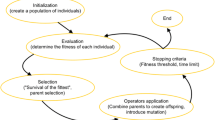Abstract
When developing multi-agent systems (MAS) or models in the context of agent-based simulation (ABS), the tuning of the model constitutes a crucial step of the design process. Indeed, agent-based models are generally characterized by lots of parameters, which together determine the global dynamics of the system. Moreover, small changes made to a single parameter sometimes lead to a radical modification of the dynamics of the whole system. The development and the parameter setting of an agent-based model can thus become long and tedious if we have no accurate, automatic and systematic strategy to explore this parameter space.
That’s the development of such a strategy that we work on suggesting the use of genetic algorithms. The idea is to capture in the fitness function the goal of the design process (efficiency for MAS that realize a given function, realism for agent-based models, etc.) and to make the model automatically evolve in that direction. However the use of genetic algorithms (GA) in the context of ABS brings specific difficulties that we develop in this article, explaining possible solutions and illustrating them on a simple and well-known model: the food-foraging by a colony of ants.
Preview
Unable to display preview. Download preview PDF.
Similar content being viewed by others
References
Sallans, B., Pfister, A., Karatzoglou, A., Dorffner, G.: Simulation and validation of an integrated markets model. J. Artificial Societies and Social Simulation 6(4) (2003)
Tisue, S., Wilensky, U.: Netlogo: Design and Implementation of a Multi-Agent Modeling Environment. Proceedings of Agent 2004 (2004)
Brueckner, S., Parunak, H.V.D.: Resource-Aware Exploration of the Emergent Dynamics of Simulated Systems. AAMAS 2003, 781–788 (2003)
Fehler, M., Klügl, F., Puppe, F.: Techniques for analysis and calibration of multi-agent simulations. In: Gleizes, M.-P., Omicini, A., Zambonelli, F. (eds.) ESAW 2004. LNCS (LNAI), vol. 3451, pp. 305–321. Springer, Heidelberg (2005)
Jin, Y.: A comprehensive survey of fitness approximation in evolutionary computation. Soft Computing Journal (2003)
Efficient parallel genetic algorithms: theory and practice. Computer Methods in Applied Mechanics and Engineering 186 (2000)
Jin, Y., Olhofer, M., Sendhoff, B.: A Framework for Evolutionary Optimization with Approximate Fitness Functions. IEEE Transactions on Evolutionary Computation 6(5), 481–494 (2002)
Beyer, H.G.: Evolutionary Algorithms in Noisy Environments: Theoretical Issues and Guidelines for Practice. Computer methods in applied mechanics and engineering 186 (2000)
Goldberg, D.E., Deb, K., Clark, J.H.: Genetic algorithms, noise, and the sizing of populations. Complex System 6 (1992)
Beker, T., Hadany, L.: Noise and elitism in evolutionary computation. In: Soft Computing Systems - Design, Management and Applications, pp. 193–203 (2002)
Amar, P., Bernot, G., Norris, V.: Modelling and Simulation of Large Assemblies of Proteins. Proceedings of the Dieppe spring school on Modelling and simulation of biological processes in the context of genomics, 36–42 (2002)
Takagi, H.: Interactive evolutionary computation: fusion of the capabilities of EC optimization and human evaluation. In: Proceedings of the IEEE, vol. 89, pp. 1275–1296. IEEE Press, Los Alamitos (2001)
Author information
Authors and Affiliations
Editor information
Editors and Affiliations
Rights and permissions
Copyright information
© 2006 Springer-Verlag Berlin Heidelberg
About this paper
Cite this paper
Calvez, B., Hutzler, G. (2006). Automatic Tuning of Agent-Based Models Using Genetic Algorithms. In: Sichman, J.S., Antunes, L. (eds) Multi-Agent-Based Simulation VI. MABS 2005. Lecture Notes in Computer Science(), vol 3891. Springer, Berlin, Heidelberg. https://doi.org/10.1007/11734680_4
Download citation
DOI: https://doi.org/10.1007/11734680_4
Publisher Name: Springer, Berlin, Heidelberg
Print ISBN: 978-3-540-33380-7
Online ISBN: 978-3-540-33381-4
eBook Packages: Computer ScienceComputer Science (R0)




